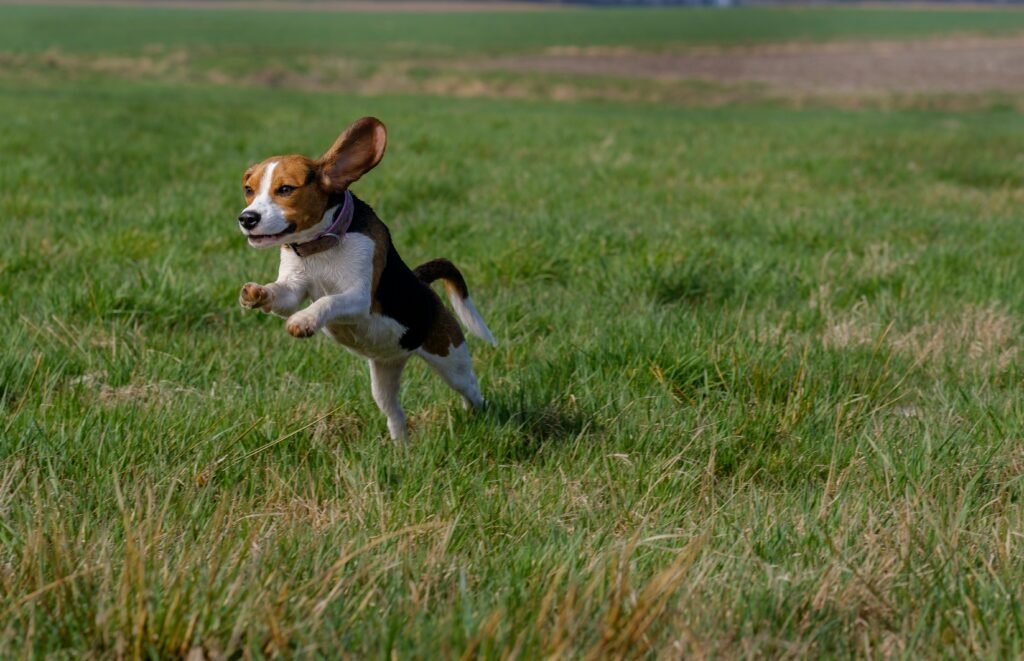Can a Beagle Be a Service Dog? What Makes Beagles Unique Candidates for Service Work
Service dogs are specially trained to perform tasks and assist individuals with disabilities to enhance their independence and quality of life.
These remarkable animals undergo rigorous training to master various tasks tailored to their handlers’ needs.In this article, we’re going to explain what makes beagles a good service dog.
We’ll also debunk some of the more widespread misconceptions that have grown up around this cherished breed!
Characteristics of Beagles
Beagles are small to medium-sized dogs known for their friendly and sociable nature. They have a distinct appearance with droopy ears and a keen sense of smell.
Beagles are renowned for their playful and energetic demeanor, making them excellent companions for families and individuals alike.
They are intelligent dogs that require mental stimulation and regular exercise to thrive. With proper training, beagles can be obedient and well-behaved pets, although they may exhibit a stubborn streak typical of hound breeds.
Additionally, beagles are gentle and affectionate, forming strong bonds with their owners and enjoying social interactions with other dogs. Overall, the characteristics of beagles make them beloved pets cherished for their loyalty, companionship, and lively personality.

Can a Beagle Be a Service Dog?
Yes, a beagle can be a service dog. While they may not be as common as some other breeds, beagles possess qualities such as intelligence, adaptability, and loyalty that make them suitable for certain service roles.
With proper training and guidance, beagles can excel in tasks such as emotional support, medical alert, and mobility assistance, providing invaluable assistance to individuals with disabilities.
Qualities of a Service Dog
Service dogs possess several qualities that make them invaluable companions for individuals with disabilities. They are known for their calm and obedient demeanor, allowing them to perform tasks reliably in various environments.
Service dogs exhibit high levels of intelligence and adaptability, enabling them to learn and execute complex tasks tailored to their handlers’ needs. Additionally, they demonstrate empathy and sensitivity to their handlers’ emotions, providing emotional support and companionship.
Service dogs forge strong bonds with their handlers, fostering trust and dependence crucial for effective assistance. Their unwavering loyalty and dedication to serving their handlers make them indispensable partners in enhancing independence and quality of life.
Training Process for Service Dogs
The training process for service dogs is comprehensive and tailored to their specific roles. It typically involves obedience training, socialization, and task-specific instruction. Professional trainers utilize positive reinforcement techniques to reinforce desired behaviors and shape the dog’s responses to various commands.
Service dogs undergo rigorous training sessions to develop skills such as retrieving items, opening doors, or providing medical alerts. Training is conducted in various environments to ensure the dog can perform reliably in real-life situations.
Additionally, service dogs receive specialized training to remain calm and focused amidst distractions and to interact appropriately with people and other animals. This thorough training process ensures that service dogs are well-prepared to assist individuals with disabilities effectively.
Beagle as a Potential Service Dog Candidate
Beagles possess several characteristics that make them potential candidates for service dog work.
Temperament
Beagles are known for their friendly and gentle temperament, making them well-suited for interacting with people, including those with disabilities.
Intelligence
Despite their playful demeanor, beagles are intelligent dogs capable of learning and performing complex tasks with proper training and guidance.
Trainability
While beagles have a reputation for being stubborn, they can be trained effectively using positive reinforcement methods and consistency.
Types of Service Work Beagles Can Excel In
Beagles can excel in various types of service work, including:
- Emotional support
- Mobility assistance
- Allergy detection
- Diabetes alert
- Search and rescue

Challenges of Using Beagles as Service Dogs
Using beagles as service dogs presents several challenges that handlers and trainers must address. One significant challenge is their strong scent drive, which can lead to distractions during training or while performing tasks in public settings.
Beagles’ natural curiosity and tendency to follow scents may require additional training and reinforcement to maintain focus on their assigned tasks. Additionally, their size, although suitable for many tasks, may limit their capability for certain assistance roles compared to larger breeds.
Beagles’ independent nature and occasional stubbornness, typical of hound breeds, can also pose challenges during training sessions, requiring patience and consistency from handlers and trainers.
Despite these challenges, with proper training and support, beagles can overcome obstacles and fulfill their roles effectively as service dogs, providing invaluable assistance and companionship to individuals with disabilities.
Success Stories of Beagle Service Dogs
There are numerous success stories of beagles serving as valuable companions and assistants to individuals with disabilities. These heartwarming tales highlight the profound impact that well-trained beagle service dogs can have on their handlers’ lives.
Debunking Beagle Myths
The Dog’s Nose and Distractions
One prevailing myth surrounding beagles is their supposed susceptibility to distractions due to their exceptional sense of smell. It’s often believed that their strong olfactory system makes it challenging for them to focus on tasks or training.
While it’s true that beagles possess an incredible sense of smell, it’s important to understand that this characteristic doesn’t necessarily impede their ability to concentrate or learn.In reality, with the right approach to training, beagles can effectively channel their keen sense of smell while remaining attentive and responsive to commands.
By employing training techniques tailored to their specific needs and temperament, such as positive reinforcement methods and consistency, beagles can learn to harness their nose power for productive tasks.In fact, their remarkable sense of smell can be leveraged for various valuable purposes.
Beagles excel in roles such as guiding individuals with visual impairments, detecting medical conditions through scent, and providing emotional support to those in need. Far from being a hindrance, their acute sense of smell becomes a valuable asset in these contexts, showcasing the versatility and adaptability of the breed.
Stubbornness and Training Challenges
Another misconception often associated with beagles is their perceived stubbornness, particularly in the realm of obedience training.
It’s commonly believed that their independent nature and hound instincts make them resistant to instruction, posing challenges for owners seeking to train them effectively.
While beagles do possess a degree of independence characteristic of hound breeds, it’s important not to mistake this for stubbornness or an inability to learn. With the right approach and mindset, beagles can be trained to be obedient and well-behaved companions.
Patience, consistency, and positive reinforcement methods are crucial elements in successfully training a beagle. By providing clear guidance, setting achievable goals, and rewarding desired behaviors, owners can effectively mold their beagles into obedient and responsive pets.
Despite any perceived challenges, beagles are renowned for their charming and charismatic nature, endearing themselves to dog lovers worldwide. Their playful demeanor and affectionate disposition make them beloved family pets, bringing joy and companionship to households everywhere.

Legal Considerations for Service Dogs
In many countries, service dogs are protected by law, granting them access to public places and accommodations alongside their handlers.
It’s essential for individuals considering a beagle as a service dog to familiarize themselves with relevant legal regulations and requirements.
Benefits of Beagle Service Dogs
Beagle service dogs offer numerous benefits, including companionship, assistance with daily tasks, and improved emotional well-being for their handlers.
Their affectionate nature and unwavering loyalty make them invaluable partners in enhancing the quality of life for individuals with disabilities.
FAQs: Beagles
Can beagles be trained to assist individuals with mobility issues?
Yes, beagles can be trained to assist individuals with mobility issues. While they may not be as large as some other service dog breeds, beagles can still provide valuable support by performing tasks such as retrieving objects, opening doors, and providing stability for individuals while walking.
Are there specific tasks that beagle service dogs excel in?
Beagle service dogs excel in various tasks depending on their training and the needs of their handlers.
Some tasks that they may excel in include:
- Retrieving items
- Providing emotional support
- Alerting to medical conditions such as seizures or diabetic emergencies
- Assisting individuals with mobility issues
How long does it typically take to train a beagle to become a service dog?
The time it takes to train a beagle to become a service dog can vary depending on factors such as the dog’s temperament, the complexity of the tasks it needs to learn, and the consistency of training. On average, it can take anywhere from several months to a year or more to fully train a beagle for service work.
Are there any special considerations when using a beagle as a service dog in public settings?
When using a beagle as a service dog in public settings, it’s essential to consider their natural curiosity and tendency to follow scents. Handlers should ensure that their beagles are trained to remain focused on their tasks despite distractions and that they are comfortable in various environments.
What are some common misconceptions about beagles as service dogs?
Some common misconceptions about beagles as service dogs include:
- They are too easily distracted by scents to be effective.
- They are too small to provide useful assistance.
- They are too stubborn to be trained effectively.
- They lack the intelligence or temperament required for service work.
Conclusion
In conclusion, while beagles may not be the most conventional choice for service dog work, they possess many qualities that make them suitable candidates for certain tasks.
With proper training, patience, and dedication, beagles can excel as service dogs, providing invaluable support and companionship to individuals with disabilities.





